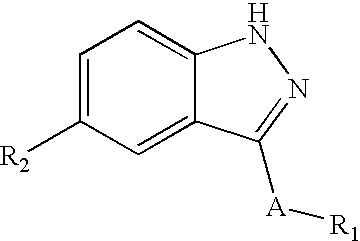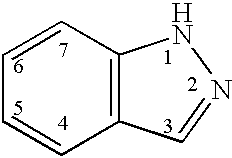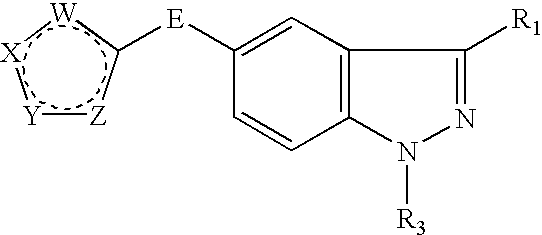Indazole derivatives as JNK inhibitors and compositions and methods related thereto
- Summary
- Abstract
- Description
- Claims
- Application Information
AI Technical Summary
Benefits of technology
Problems solved by technology
Method used
Image
Examples
example 1
Synthesis of 3-(4-Methoxyphenyl)-1H-Indazole
[0139] 18
[0140] A. 3-Bromo-1H-indazole
[0141] To a suspension of 1H-indazole (3.00 g, 25.4 mmol) in 2.0 M sodium hydroxide solution (70 mL) at ambient temperature was added a solution of bromine (3.00 g, 18.8 mmol) in 2.0 M sodium hydroxide solution (30 mL) dropwise. After stirring for 3 hours, to the reaction mixture was added sodium bisulfite (0.1 g), followed by 2.0 N hydrochloric acid solution (80 mL). The precipitates were filtered and washed with water to provide the title compound (3.98 g, 80% yield): mp 136.degree. C.; .sup.1H NMR (CDCl.sub.3) .delta. 13.4 (br s, 1H), 7.57 (m, 2H), 7.45 (t, 1H), 7.22 (t, 1H); EI-MS (m / z) 198 [M+2].sup.+, 196 [M].sup.+.
[0142] B. 3-(4-Methoxyphenyl)-1H-indazole
[0143] A mixture of 3-bromo-1H-indazole (0.20 g, 1.0 mmol), 4-methoxyphenylboronic acid (0.228 g, 1.5 mmol), and tetrakis(triphenylphosphine)palladium(0) (0.228 g, 0.1 mmol) in ethylene glycol dimethyl ether (5 mL) and 2.0 M sodium carbonate sol...
example 2
Synthesis of 3-(4-Hydroxyphenyl)-1H-Indazole
[0144] 19
[0145] A. 3-Bromo-1-[2-(methoxyethoxy)methyl]-1H-indazole
[0146] To a solution of 3-bromo-1H-indazole (6.15 g, 31 mmol) in dried tetrahydrofuran (40 mL) at ambient temperature was added 1.0 M solution of sodium bis(trimethylsilyl)amide in tetrahydrofuran. After stirring 20 minutes, to the mixture was added neat 2-methoxyethoxymethyl chloride (4.36 g, 35 mmol). The reaction mixture was stirred at ambient temperature overnight. It was quenched with water and extracted with chloroform. The extracts were dried over magnesium sulfate, filtered, and concentrated. The residue was then purified by chromatography (SiO.sub.2, 15-30% ethyl acetate / hexane) to provide the title compound (6.512 g, 74% yield): EI-MS (m / z) 286 [M+2].sup.+, 284 [M].sup.+.
[0147] B. 1-[2-(Methoxyethoxy)methyl]-3 (4-methoxyphenyl)-1H-indazole
[0148] A mixture of 3-bromo-1-[2-(methoxyethoxy)methyl]-1H-indazole (0.640 g, 2.2 mmol), 4-methoxyphenylboronic acid (0.456 g, 3...
example 3
Synthesis of 3-(2-Methoxyphenyl)-1H-Indazole
[0151] 20
[0152] A. 1-[2-(Methoxyethoxmethyl]-3-(2-methoxyphenyl)-1H-indazole
[0153] The title compound was prepared as described in Example 2 B, using 2-methoxyphenylboronic acid (0.304 g, 2.0 mmol) (0.235 g, 48% yield): .sup.1H NMR (CDCl.sub.3) .delta. 7.74 (d, 1H), 7.49 (m, 3H), 7.32 (t, 1H), 7.04-7.15 (m, 3H), 5.73 (s, 2H), 3.78 (s, 3H), 3.65 (m, 2H), 3.41 (m, 2H), 3.29 (s, 3H); EI-MS (m / z) 312 [M].sup.+.
[0154] B. 3-(2-Methoxyphenyl)-1H-indazole
[0155] A solution of 1-[2-(methoxyethoxy)methyl]-3-(2-methoxyphenyl)-1H-in-dazole (0.20 g, 0.64 mmol) in 1,4-dioxane (4 mL) and 6 N hydrochloric acid solution (4 mL) was stirred at ambient temperature for 16 hours. It was neutralized with saturated sodium carbonate solution and extracted with chloroform. The extracts were dried over magnesium sulfate, filtered, and concentrated. The residue was then purified by chromatography (SiO.sub.2, 20-40% ethyl acetate / hexane) to provide the title compound (...
PUM
| Property | Measurement | Unit |
|---|---|---|
| Structure | aaaaa | aaaaa |
| Pharmaceutically acceptable | aaaaa | aaaaa |
Abstract
Description
Claims
Application Information
 Login to View More
Login to View More - R&D
- Intellectual Property
- Life Sciences
- Materials
- Tech Scout
- Unparalleled Data Quality
- Higher Quality Content
- 60% Fewer Hallucinations
Browse by: Latest US Patents, China's latest patents, Technical Efficacy Thesaurus, Application Domain, Technology Topic, Popular Technical Reports.
© 2025 PatSnap. All rights reserved.Legal|Privacy policy|Modern Slavery Act Transparency Statement|Sitemap|About US| Contact US: help@patsnap.com



